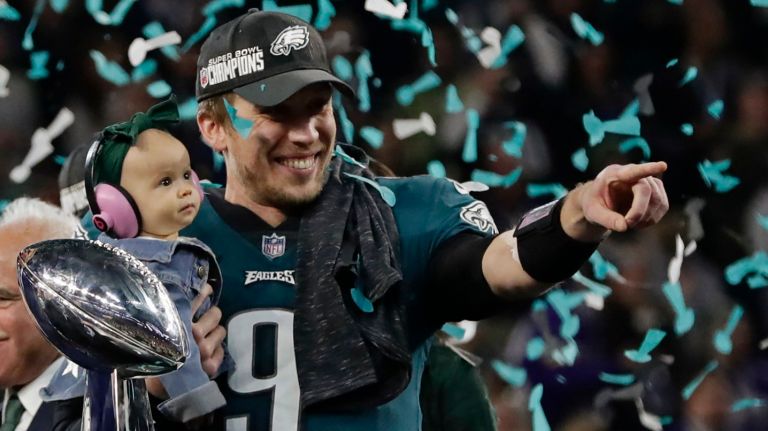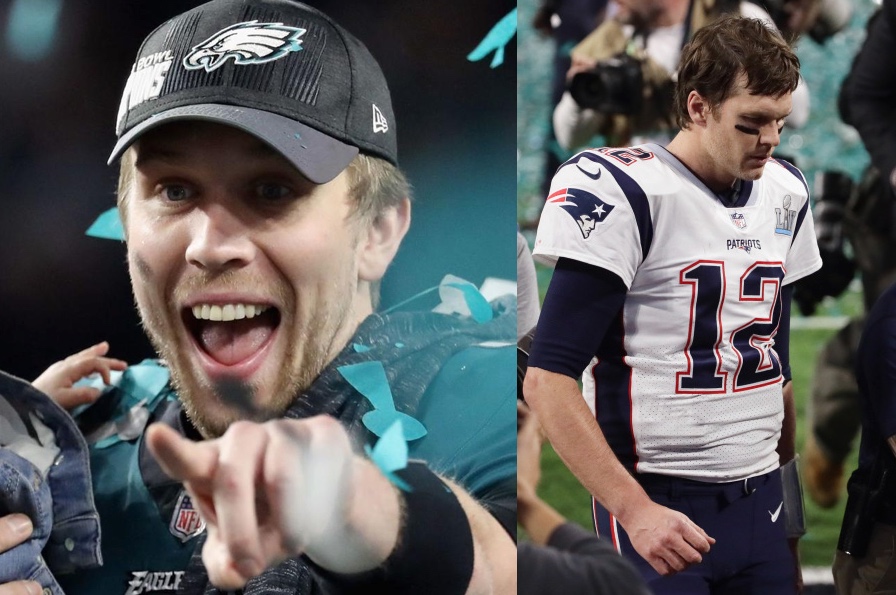Yesterday, Nick Foles and the Philadelphia Eagles won Super Bowl LII over Tom Brady and the New England Patriots. The game was Philly’s first Super Bowl victory in NFL history, and New England’s third Super Bowl loss of the Tom Brady-Bill Belichick era.
It also epitomizes everything that’s right — and wrong — with storytelling in sports.
That’s because sports narratives do one thing that no other storytelling format does: sports stories perpetually trick us into believing that they only make sense in reverse.
Here’s what I mean.
Sports Makes Us Recast Our Heroes and Villains on the Fly

This man was one play away from being the bad guy
In the lead-up to the game, you could read about how the Eagles’ feel-good locker room culture has created a team mindset that’s destined to win a championship… or you could read about the legendarily weird practice quirk that insiders claim is the real reason for the Patriots’ success.
Or you could read about how Tom Brady is a freak of physical perfection, being named league MVP at the geriatric (for the NFL) age of 40 even while he builds his second career as a wonky health guru… or about how Nick Foles’s return to Philly after he was traded away a few seasons ago was destiny in the making.
The problem?
These kinds of dueling narratives can’t both be seen as “true,” because their validity is ultimately determined by three factors:
- Who wins the game?
- Whom do we WANT to win the game?
- How does HOW the game was won align with how we think the game SHOULD’VE been won?
For example…
If the Eagles win, this victory is easily explained as a testament to their culture… so does the corresponding loss mean that the Patriots’ practice habits are now meaningless?
Conversely, if the Patriots had won, that story about their practice habits would be bulletin board material in every locker room and corporate boardroom in America… while the rah-rah story about the Eagles turnaround would be buried beneath “being nice doesn’t win you ballgames” platitudes.
Or consider the solo saga of individual players.

It was the best of times, it was the worst of times…
G.O.A.T. v Goat
Since Tom Brady played in his 8th Super Bowl but lost, does that mean he’s still overachieving for a 40 year-old quarterback… or is he underachieving compared to “vintage Brady”?
Is Nick Foles the feel-good sports story of the year… or is his success causing a quarterback controversy that will tear the future of the Philadelphia Eagles apart?
How every one of these stories will be measured and processed by future generations all comes down to one play: in the 4th quarter of Super Bowl 52, with the Eagles up by 5 and the ball in the Patriots’ hands, Tom Brady drops back with a chance to throw the game-winning touchdown… but he gets sacked by Brandon Graham and fumbles the ball instead.
This is the play that turns Brandon Graham from a “bust” into a Super Bowl hero, and Tom Brady from the Greatest of All-Time into a goat.
And the Moral of This Story Is… TBD
Ultimately, how we process any sports narrative depends on two overlapping factors:
- The inherently tribal nature of sports fandom, and
- Our unquenchable desire for cause-and-effect narratives
As with any story, we still want heroes and villains, we wants rewards and punishments, and we want the characters’ actions to lead to deserved outcomes on both sides.
But unlike traditional character arcs, who “deserves” what in a sports story is determined not necessarily by the players’ actions but by how we feel about the players’ actions.
Tom Brady played a statistically better game than Nick Foles… but Nick Foles won the game.
As a result, our appreciation of any sports story hinges entirely on how it reads in reverse.
This means Eagles fans (and Patriots haters) will believe a cosmic justice was somehow reestablished by denying the Patriots what would have been their record-tying 6th Super Bowl victory (hello, Pittsburgh Steelers fans).
It also means that we’ll claw through history to find poetic parallels, like Tom Brady losing the ball and the game in a reversal of the exact same “tuck rule” play that launched his Super Bowl career 16 years ago.
Perhaps most absurdly, it means journalists can refer to Super Bowl LII as both “an unforgettable, nail-biting pure spectacle” and a ratings disaster and both takes can be right.
Which, ironically, means that sports is the only kind of storytelling in which the ending automatically rewrites everything that came before it.
Tom Brady is the 1st QB in NFL history to lose a game with at least 500 passing yards, 3 TD and 0 interceptions (regular season or playoffs). pic.twitter.com/fryLNXdBIO
— ESPN Stats & Info (@ESPNStatsInfo) February 5, 2018
If You Liked This Post
… then you may also like my analysis of why every Marvel movie tells the same story, or the story flaw that keeps Molly’s Game from becoming a classic.


0 Comments